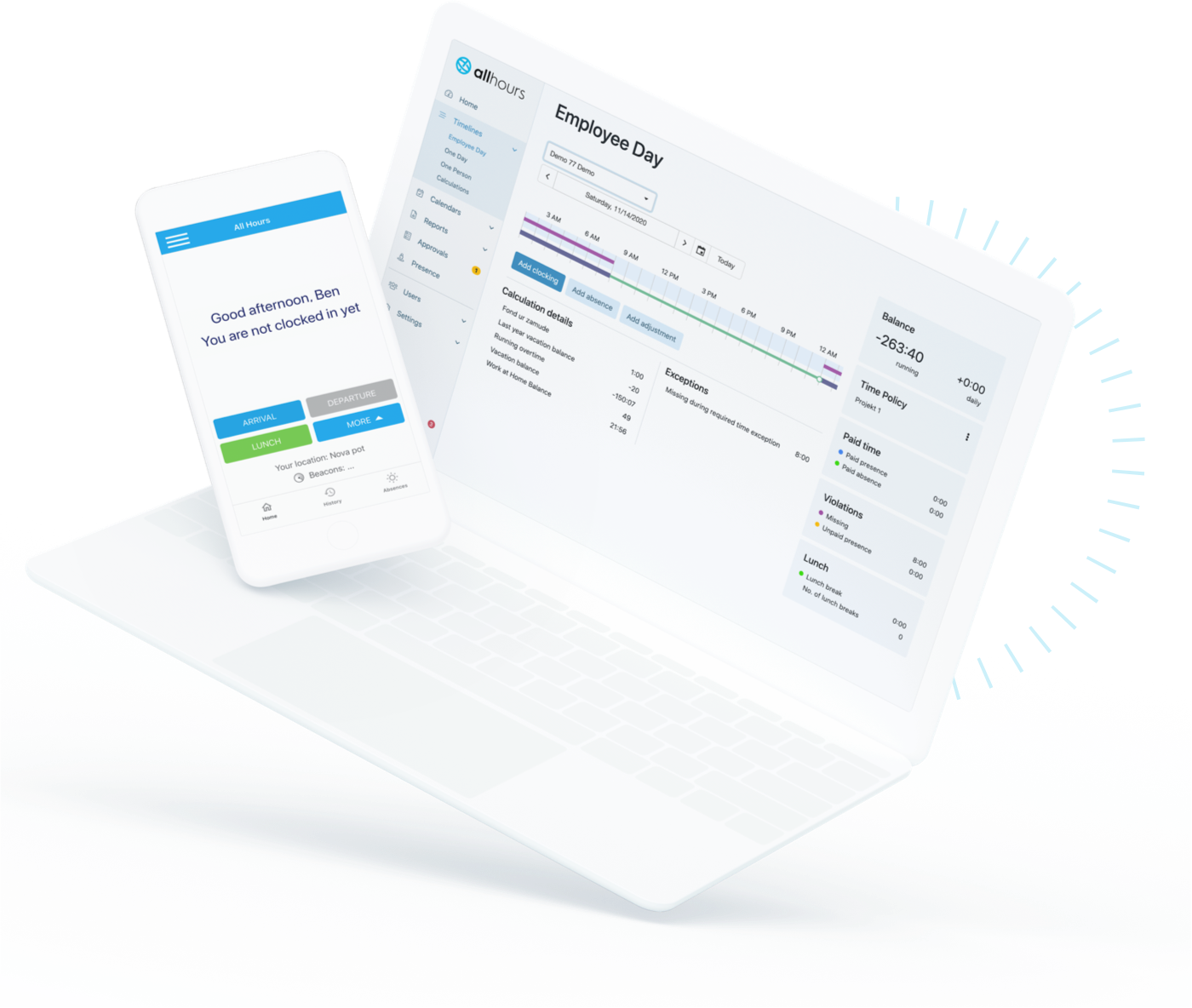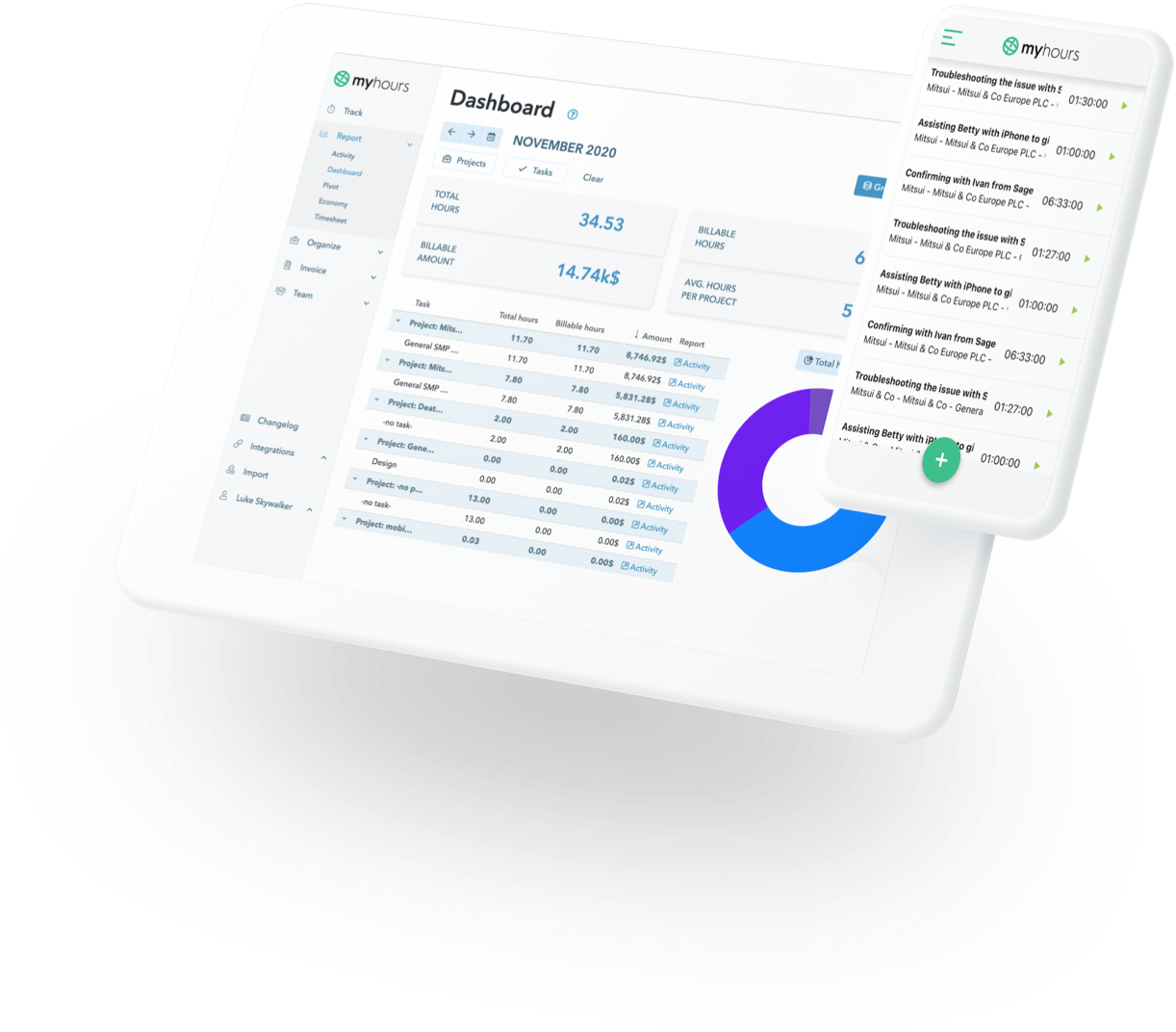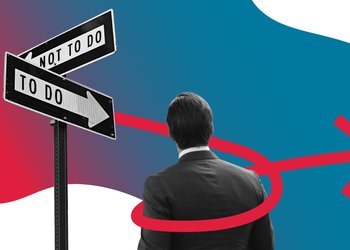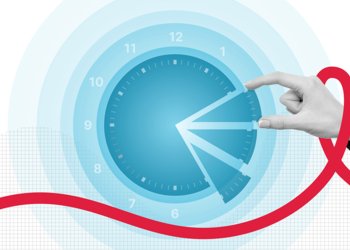Multitasking - We simply don’t have the brainpower to do it
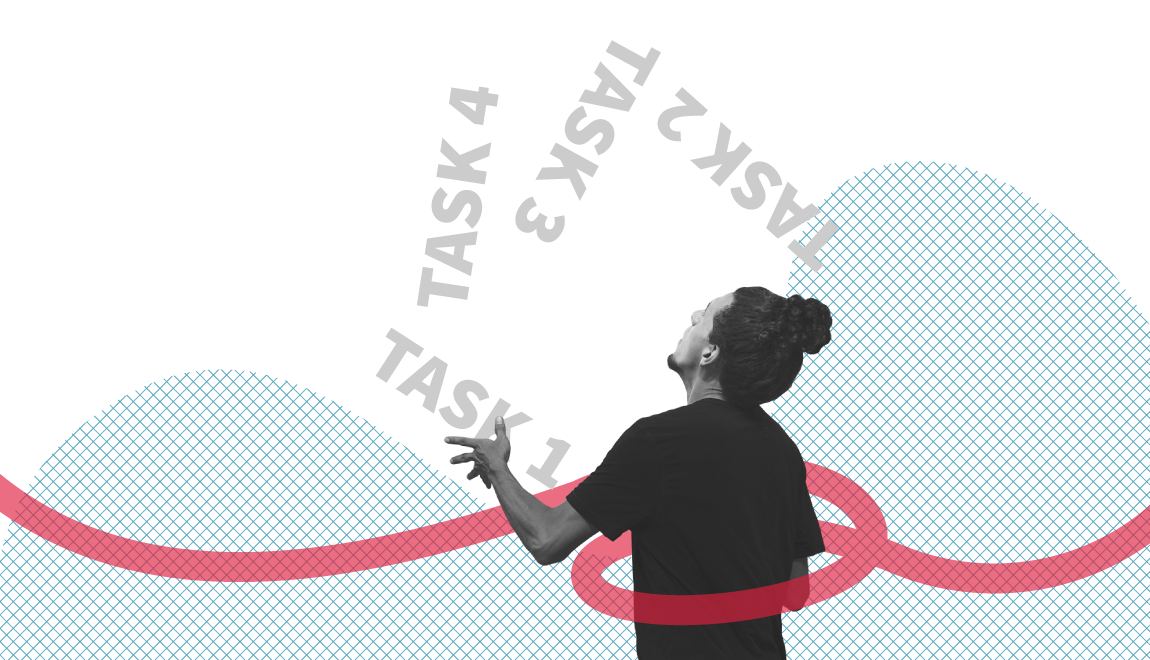
Extraordinary multitasking abilities are rare. One study found that just 2.5% of people multitask effectively. For the rest of us, our attempts to do several activities at once usually fail, and instead, we just switch tasks.
Even though we have brains with billions of neurons and many trillions of connections, we seem incapable of doing multiple things at the same time. To make the whole situation worse - this kind of mental "juggling” is killing our productivity and makes us more error-prone.
Multitasking as an attempt to do two or more tasks simultaneously is thus a myth, and one that makes us less effective in our jobs and our lives.
To improve your way of working, we have taken a look at some scientific task-switching experiments and compiled a bunch of quick fix-tips to maximize your productivity and wellbeing.
Instead of anticipating the never-ending multitasking challenges that life throws at you - especially in a post-covid world, our goal is to support you in focusing on what really matters.
- Mental juggling is a silent killer
- The multi-costs of multitasking
- Multitasking is not necessarily a bad thing
- A complicated task calls for single-tasking
- Some helpful habits to help you overcome multitasking
- 1. Become single-minded
- 2. Stick with one item until completion
- 3. Don’t waste precious time
- 4. Unplugging is your task, too
- 5. Be organised and finish what you start
- 6. Better to say “no”, than do it halfway
- Women Are Not Better at Multitasking
- Mono-taskers, light multitaskers, and heavy multitaskers
Mental juggling is a silent killer
Rarely has the world of work undergone so many fundamental changes in such a short period and on a global scale as it has because of the pandemic. Almost no business escaped introducing or at least reinforcing remote working, and almost overnight.
Most of us spent our time switching from Zoom meetings to Team Chats, scrolling social media, emailing, and texting – just trying to do more at one time, sometimes even simultaneously.
More than ever before we are pulled in different directions, intrigued by several sources of information. In the digital world multitasking with media is inevitable.
Research shows, for instance, that American youths spend on average 7.5 h every day with media, and 29% of that time is spent processing different forms of media simultaneously. Data from other countries show a similar pattern for both teenagers and adults.
We live in the attention economy but know little about the consequences of such intense dispersion of mental focus for human beings. Do our brains slow down? Do stress levels rise?
The multi-costs of multitasking
So-called media switching is not as innocent as it might look.
A wide range of research on multitasking over the past few decades has revealed that the human brain evolved to single-task.
In ignoring that fact by attempting to multitask, we cause a reduction in performance, accuracy, and speed. Multitaskers take longer to complete a task and make more errors when switching between tasks than single-taskers.
“Media multitaskers also pay a mental price,” this Stanford study shows.
People who are regularly bombarded with several e-channels of communication do not pay attention, control their memory, or switch from one job to another as well as those who prefer to complete one task at a time.
They are not able to filter out what's not relevant to their current goal.
If you think you can talk on the phone, answer a Slack message, and read your e-mail all at once, eventually this will backfire. Stanford researchers warn that even trying may impair your cognitive control.
Multitasking can lead to mental fatigue and cause people to exhibit disrespectful behavior toward others.
Another pitfall is that multitasking affects our ability to learn, because to learn we need to be able to focus sharply. Recent research has shown that students learn less when texting or using social media while attending lectures.
Even reading proficiency and homework accuracy decrease if we multitask with instant messaging. One study found that college students who tried to multitask took longer to do their homework and had lower average grades.
If we don’t practice tuning out the rest of the word, we slowly lose our ability to focus; and in a world where agility, flexibility, and adaptability are highly respected, the ability to learn is the most in-demand soft skill of 21st Century. Do not threaten it.
Multitasking is not necessarily a bad thing
Human multitasking is a quite a controversial topic, where the context matters a lot.
Unlike the majority of research on the topic, which has focused on the disadvantages of task switching, some recent studies have uncovered a potential upside: increased creativity.
Task switching can increase your creativity by reducing cognitive fixation on a problem.
It can also teach you how to deal with chaos and manage the difficult situations you encounter.
When it comes to undemanding tasks, multitasking can save time and money, keeps you from being bored, reduces procrastination, enhances your out-of-the-box thinking, and energizes you.
A complicated task calls for single-tasking
Multiple studies have confirmed that true multitasking (doing more than one task at the same time) is a myth when it comes to complex tasks.
When you split your attention between multiple tough tasks simultaneously, you aren’t actually getting more done - you are doing less, getting more stressed out, and performing worse.
This is especially true when your mission tasks require your full attention.
It’s all fine to watch TV and sprinkle your flowers, but not so if you are driving and sending out texts. It has been more or less taken for granted that operating a car cannot be combined with any other task without affecting driving performance.
Based on over half a century of cognitive
science and more recent studies on multitasking, it has been proved that trying
to multitask can negatively impact our lives – or even be dangerous. Multitaskers do less and miss
information.
Some helpful habits to help you overcome multitasking
1. Become single-minded
Instead of trying to multitask, work on your ability to single-mindedly focus on one task at a time. It’s called deep work.
Putting your full attention into something pays off. It creates extraordinary results and enables you to reach the depth that is needed, as opposed to splitting your efforts, which is the fastest way to fail. Simplicity is the art of reducing something to its essence.
In everyday life, single-mindedness can be practiced easily. Pick a task, something that you have to do that isn’t necessarily fun or exciting, and then commit to performing that task for a full 20 minutes. No more, no less.
You can use a time tracker to make sure you hit the 20 minutes if necessary. By doing so you will strengthen your commitment skills, and you will build self-discipline in a world where everybody lacks focus.
When you multitask, you rarely have enough time to complete your work, and you will seldom do it to perfection. Having too much on your plate only complicates things and leads to frustration.
Mindfulness comes with lots of benefits for our minds and our bodies. Many therapies based on mindfulness can even help patients suffering from depression, anxiety, chronic pain and other conditions.
2. Stick with one item until completion
Make an effort to do tasks one at a time. If your attention starts to wane, typically after about 18 minutes, you can switch to a new task - but take a moment to leave yourself a note about where you stopped with the first one.
Then give the new task your full attention, again for as long as you can.
3. Don’t waste precious time
At first glance, multitasking may seem efficient but research has shed light on the reality.
According to the American Psychological Association, even the brief mental blocks created by shifting between tasks can cost as much as 40 percent of your productive time.
As the tasks in the research got more complex, participants lost more time, and, people took significantly longer to switch between more complex tasks. The time costs were also greater when the participants switched to relatively unfamiliar tasks.
4. Unplugging is your task, too
We face extreme pressure in terms of time. Life rarely slows down, so setting limits with your to-do lists is your priority.
Healthy habits are the secret to doing great work – sleeping, eating, taking short breaks, or working out is sometimes better than doing an extra hour of work. Make sure you “sharpen the saw” and take good care of yourself.
No one should expect us to be always on call – and that includes ourselves, too. It’s been estimated that “presenteeism” (being on the job but ill) costs US businesses around $226 billion a year in lost productivity!
5. Be organised and finish what you start
When it comes to work, the goal is to do more of what matters and fewer meaningless tasks. Creating a chaotic schedule is not a good idea.
Keep a to-do list and block out time in your calendar to work on tasks (the technique known as timeboxing).
Not requiring an instant response to messages and emails simplifies communication across time zones, allows for deep work, and encourages employees to switch off.
Also, know when to close your door. In the past, people did this when they had to work hard on something, commit to deep work, or just needed to clear their mind.
Doing the same thing with electronic devices is perhaps even more important if you want to be productive and creative. Set aside some time when people know you are going to focus.
Switch of chats and pings and do not feel guilty over it. You can always catch up later on with a real-time-and-space date.
6. Better to say “no”, than do it halfway
There is another pitfall to multitasking: in these times of the COVID-19 epidemic, working from home, far from the watchful eyes of your colleagues, means it’s much easier to multitask - or at least to pretend to.
People aren’t always giving Zoom or any other virtual interactions their full attention in the first place, and as we all know, there’s an opportunity with remote meetings to just ‘sort-of’ attend.
There is the option to turn the camera off, and just have the meeting playing in the background while you do other things (like cooking, dusting, grocery shopping, or anything else around the house that needs doing).
According to a 2021 Microsoft study, remote workers do multitask during videoconferences—especially when the group is large and the meeting runs long. In 30 percent of meetings, the study found that people had sent emails.
You might feel like Superman when doing it, but the truth is there is not much power in such behaviors, and it is disrespectful to others.
Women Are Not Better at Multitasking
There is a widespread stereotype that women are better at multitasking. However, this myth has never been supported by evidence, meaning that the extra family work women perform is just that – extra work. And we need to see it as such.
The study, published in the journal Plos One, found that neither sex was better than the other when it came to dividing their attention among more than one task. Men and women equally use multitasking skills to do their work.
It is true, however, that the concept of multitasking skills started in domestic environments where people (mostly women) were known to work on many different household chores at the same time.
So, there is even a dangerous side to this misbelief: the multitasking myth means mothers are expected to “do it all.” But this obligation can affect women’s mental health, as well as their capacity to excel at work.
Many refer to the debunking of these myths about women being superheroes as a good thing. To thrive, we need more systemic help.
Mono-taskers, light multitaskers, and heavy multitaskers
With flexible work on the rise, the fact that technological demands are here to stay and an increasingly confusing world mean that chaotic uncertainty might be the new normal.
To avoid an overload of work and information, which will only lead to exhaustion, fatigue, or frustration, we should all plan our daily lives according to the idea that multitasking might bring nothing but a hectic pace and lower productivity.
The brain works on one project at a time.
Partial attention simply cannot lead to perfect results. We’re wired to be mono-taskers, meaning that our brains can only focus on one task at a time anyway, so maybe it's time to stop e-mailing while you are on the Teams conference, and switch your thinking to single-minded, full-focus tasks?
Of course, there has never been a perfect rule, and for some heavy multitaskers juggling might switch on the magical creative spark; but as the majority of us are mono-taskers, or very light mental jugglers unable to commit to more than a single thing at the moment, it's best to avoid trying to multitask in the first place.
The more we multitask, the less we accomplish. The less we multitask, the better we get.

